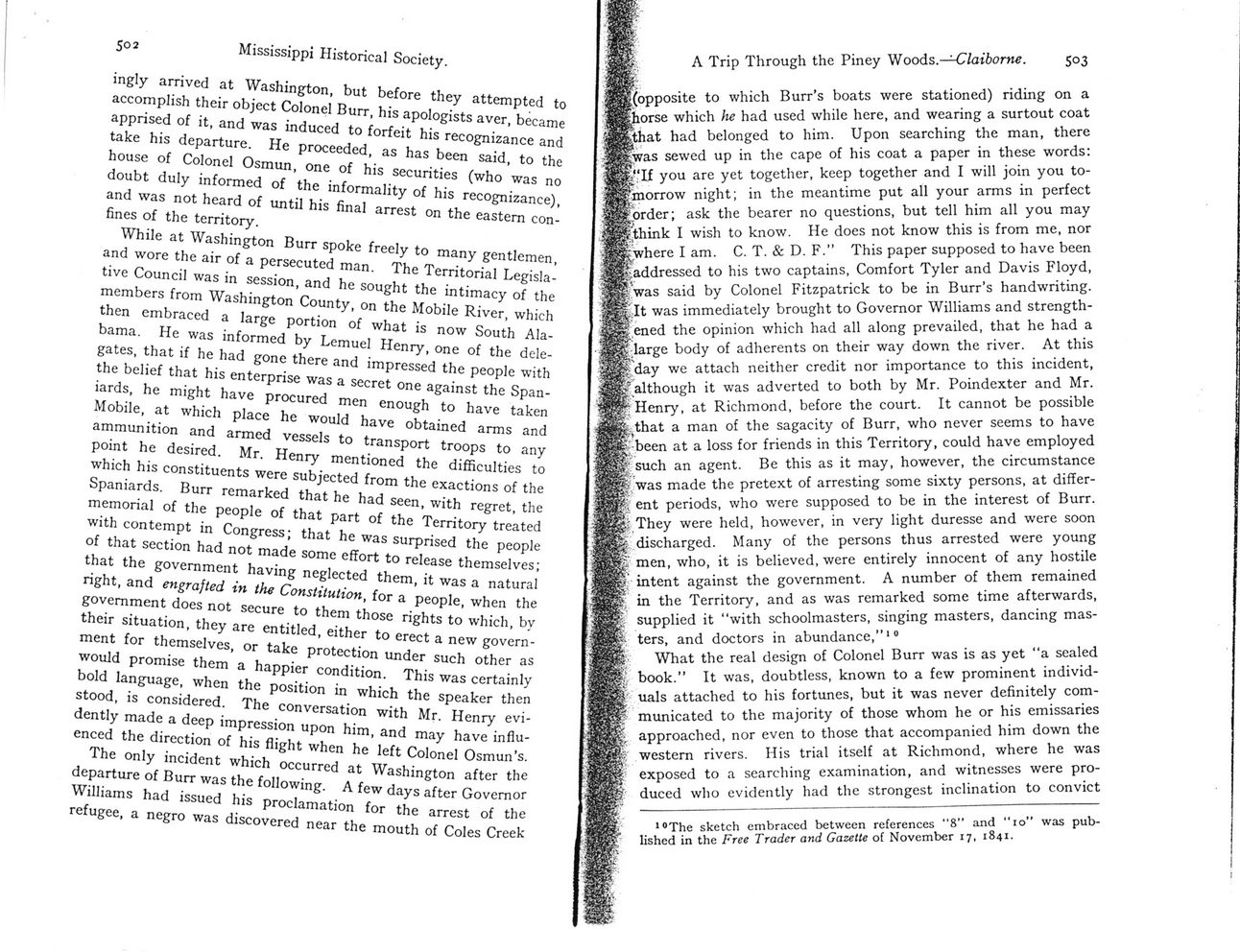This text was obtained via automated optical character recognition.
It has not been edited and may therefore contain several errors.
Mississippi Historical Society. ingly arrived at Washington, but before they attempted to accomplish their object Colonel Burr, his apologists aver, became apprised of it, and was induced to forfeit his recognizance and take his departure. He proceeded, as has been said, to the house of Colonel Osmun, one of his securities (who was no doubt duly informed of the informality of his recognizance), and was not heard of until his final arrest on the eastern confines of the territory. While at Washington Burr spoke freely to many gentlemen, and wore the air of a persecuted man. The Territorial Legislative Council was in session, and he sought the intimacy of the members from Washington County, on the Mobile River, which then embraced a large portion of what is now South Alabama. He was informed by Lemuel Henry, one of the delegates, that if he had gone there and impressed the people with the belief that his enterprise was a secret one against the Spaniards, he might have procured men enough to have taken Mobile, at which place he would have obtained arms and ammunition and armed vessels to transport troops to any point he desired. Mr. Henry mentioned the difficulties to which his constituents were subjected from the exactions of the Spaniards. Burr remarked that he had seen, with regret, the memorial of the people of that part of the Territory treated with contempt in Congress; that he was surprised the people of that section had not made some effort to release themselves; that the government having neglected them, it was a natural right, and engrafted in the Constitution, for a people, when the government does not secure to them those rights to which, bv their situation, they are entitled, either to erect a new government for themselves, or take protection under such other as would promise them a happier condition. This was certainly bold language, when the position in which the speaker then stood, is considered. The conversation with Mr. Henry evidently made a deep impression upon him, and may have influenced the direction of his flight when he left Colonel Osmun?s. The only incident which occurred at Washington after the departure of Burr was the following. A few days after Governor Williams had issued his proclamation for the arrest of the refugee, a negro was discovered near the mouth of Coles Creek A Trip Through the Piney Woods.?-Claiborne. 503 (opposite to which Burr?s boats were stationed) riding on a horse which he had used while here, and wearing a surtout coat that had belonged to him. Upon searching the man, there :was sewed up in the cape of his coat a paper in these words: -??If you are yet together, keep together and I will join you tomorrow night; in the meantime put all your arms in perfect ?.order; ask the bearer no questions, but tell him all you may (think I wish to know. He does not know this is from me, nor rwhere I am. C. T. & D. F.? This paper supposed to have been ^addressed to his two captains, Comfort Tyler and Davis Floyd, . was said by Colonel Fitzpatrick to be in Burr?s handwriting. lit was immediately brought to Governor Williams and strength- ? ened the opinion which had all along prevailed, that he had a 'large body of adherents on their way down the river. At this ? day we attach neither credit nor importance to this incident, ? although it was adverted to both by Mr. Poindexter and Mr. Henry, at Richmond, before the court. It cannot be possible (that a man of the sagacity of Burr, who never seems to have ?been at a loss for friends in this Territory, could have employed such an agent. Be this as it may, however, the circumstance was made the pretext of arresting some sixty persons, at different periods, who were supposed to be in the interest of Burr. They were held, however, in very light duresse and were soon discharged. Many of the persons thus arrested were young men, who, it is believed, were entirely innocent of any hostile intent against the government. A number of them remained in the Territory, and as was remarked some time afterwards, supplied it ?with schoolmasters, singing masters, dancing masters, and doctors in abundance,?10 What the real design of Colonel Burr was is as yet "a sealed book.? It was, doubtless, known to a few prominent individuals attached to his fortunes, but it was never definitely communicated to the majority of those whom he or his emissaries approached, nor even to those that accompanied him down the western rivers. His trial itself at Richmond, where he was exposed to a searching examination, and witnesses were produced who evidently had the strongest inclination to convict l0The sketch embraced between references ?8? and ?10? was pub- lished in the Free Trader and Gazette of November 17, 1841.

Claiborne, J.F.H Claiborne-J.F.H-019